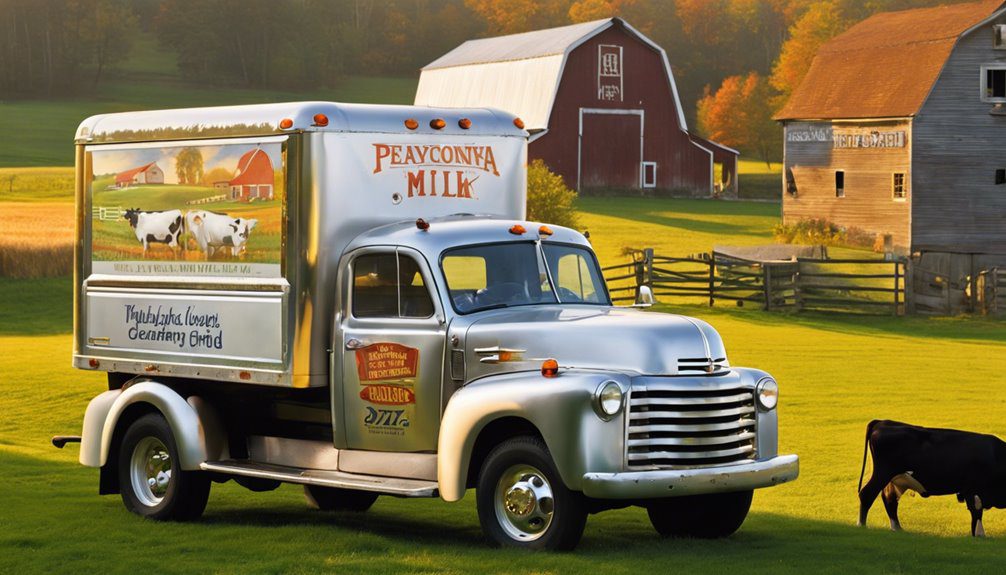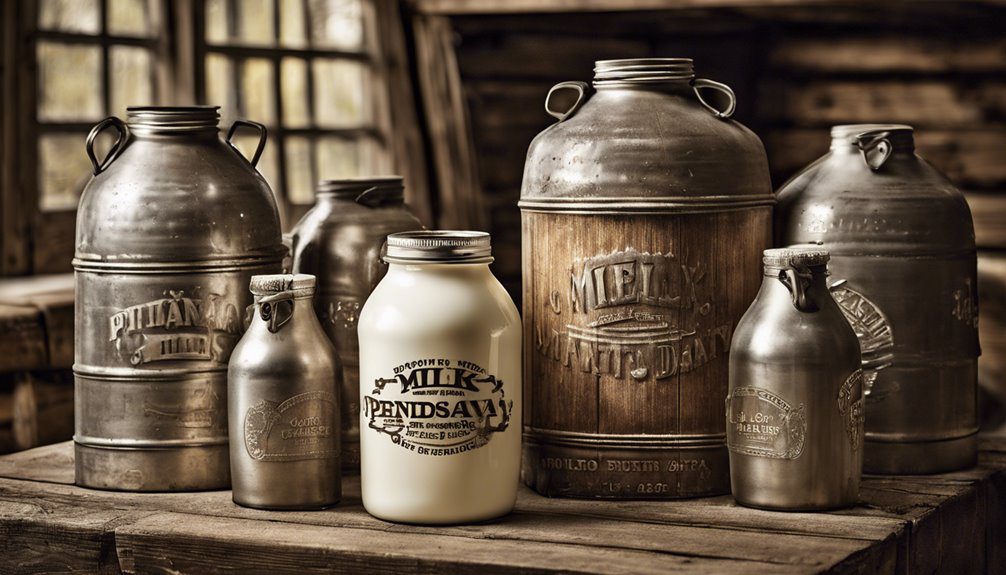If you're involved in the dairy industry in Pennsylvania, understanding the Milk Dealer Bond is essential for your operation. This bond not only ensures compliance with state regulations but also acts as a safeguard for both you and your customers. You might wonder how this bond impacts your credibility and what steps you need to take to secure one. The implications can be significant, and knowing the ins and outs could make a difference in your business approach. So, what should you consider as you navigate this requirement?
What Is a Milk Dealer Bond?

A milk dealer bond is a type of surety bond that ensures compliance with state regulations for businesses involved in the buying, selling, or distributing of milk. If you're operating in this industry, you'll need to secure this bond to demonstrate your commitment to following the law and protecting consumers.
This bond acts as a financial guarantee that you'll uphold all relevant statutes and obligations related to milk handling. In Pennsylvania, regulations require you to obtain this bond before conducting business.
It covers potential damages resulting from violations of laws or regulations, ensuring that your actions won't harm consumers or the industry. If a claim arises due to your non-compliance, the bond provides compensation, which you'd ultimately be responsible for repaying.
Obtaining a milk dealer bond involves an application process where a surety company assesses your financial stability and business practices. By securing this bond, you not only comply with state requirements but also build trust with customers and suppliers. Surety bonds enhance credibility and trustworthiness of businesses, providing an additional layer of protection for all parties involved.
This bond is essential for your operational credibility and helps foster a safer marketplace for everyone involved in the milk industry.
Importance of the Bond
Securing a milk dealer bond is crucial for anyone in the milk industry, not just to comply with state regulations but also to establish credibility and trust with customers and suppliers.
When you have this bond, it showcases your commitment to ethical business practices and financial responsibility. A milk dealer bond acts as a safety net, ensuring that you can meet your financial obligations, such as paying suppliers on time.
This bond protects your customers by providing a means of compensation in case of disputes or financial failures. Knowing that you're bonded can help reassure your clients that their interests are protected, fostering stronger relationships and repeat business.
Moreover, having a bond can give you a competitive edge in the industry. Many clients prefer working with bonded dealers because it reflects reliability and professionalism.
It can also increase your chances of securing contracts with larger suppliers and retailers. Ultimately, investing in a milk dealer bond isn't just a legal requirement; it's a smart business move that can enhance your reputation and lead to long-term success in the milk industry. Additionally, similar to Illinois Surety Bonds, the bond serves as an assurance that you will fulfill your obligations to your clients and suppliers.
Eligibility Requirements

Before you can obtain a milk dealer bond, it's important to understand the eligibility requirements set by Pennsylvania. First, you need to be a licensed milk dealer in the state. This means you must meet the necessary state regulations and have the proper permits to operate your business.
Next, your business should demonstrate financial stability. You'll likely need to provide financial statements that show you can meet your obligations, which helps assure the surety company that you're a trustworthy candidate for the bond. Additionally, your credit history plays a role; a strong credit score can facilitate the bonding process.
You should also be free of any major legal or regulatory issues. If you've faced past violations or penalties related to milk handling, it could impact your eligibility. Furthermore, having a clean record of compliance with Pennsylvania's milk marketing laws will strengthen your application.
Lastly, if you're a new business owner, some surety companies may require you to provide personal guarantees or collateral as part of the bonding process. Meeting these requirements will set you on the right path to securing your milk dealer bond in Pennsylvania.
Application Process
Navigating the application process for a Pennsylvania milk dealer bond involves several key steps that can make or break your chances of approval.
First, you'll need to gather all necessary documentation, such as your business information, financial statements, and any required licenses. This step ensures you have everything you need to present a complete application.
Next, you'll want to find a surety company that's authorized to issue bonds in Pennsylvania. Researching multiple providers allows you to compare rates and terms.
Once you've selected a surety, you'll submit your completed application along with the required documents. Be prepared to provide personal and business financial information, as the surety will assess your creditworthiness.
After submission, the surety company will review your application. They may ask for additional information or clarification, so be ready to respond promptly.
If approved, you'll receive a quote for the bond amount and premium. Make sure you understand the terms before committing.
Bond Amounts and Coverage

Once your application for a Pennsylvania milk dealer bond is approved, you'll need to understand the specific bond amounts and coverage required by the state. Typically, the bond amount is set at $10,000, but it can vary based on your business's volume and the specific agreements with your suppliers. This bond acts as a financial guarantee that you'll adhere to state laws and fulfill your obligations to milk producers.
It's crucial to realize that this bond protects the interests of milk producers and distributors in case you fail to meet your contractual obligations. If you default on payments, a claim can be made against the bond, and the surety company will step in to cover the losses up to the bond amount. You'll be responsible for reimbursing the surety for any claims paid out.
Before finalizing your bond, review the coverage details carefully. You want to ensure that it meets all regulatory requirements and adequately protects your business relationships. Additionally, understanding the role of surety companies is essential to ensure you have the right support in place for your bond.
Being proactive about understanding bond amounts and coverage can help you avoid potential issues down the line and keep your operations running smoothly.
Renewal and Cancellation
Renewing your Pennsylvania milk dealer bond is a crucial step to ensure uninterrupted compliance with state regulations.
You'll want to keep an eye on your bond's expiration date, typically set for one year from the date of issuance. Starting the renewal process early can help you avoid any lapses in coverage.
To renew, you'll usually need to provide updated information about your business and may have to undergo a review process again.
Be prepared to pay any renewal fees and submit the necessary paperwork to your surety company. They'll issue a new bond once everything checks out, keeping you compliant with Pennsylvania law.
If you decide to cancel your bond, it's essential to notify your surety company in writing.
They'll guide you through the cancellation process, which may involve specific timelines or conditions.
Consequences of Non-Compliance

Failing to comply with Pennsylvania's milk dealer bond requirements can lead to serious repercussions for your business. First and foremost, you might face hefty fines imposed by state regulatory agencies, which could strain your financial resources.
Additionally, non-compliance could result in the suspension or revocation of your milk dealer license, effectively halting your operations and affecting your income.
Moreover, if you don't maintain the bond, your suppliers might lose trust in your ability to meet obligations. This loss of credibility can damage your relationships and make it difficult to procure milk or other dairy products.
You could also find yourself facing legal action from customers or suppliers if they suffer losses due to your non-compliance.
In the worst-case scenario, you might end up in bankruptcy or insolvency, especially if you can't recover from the financial penalties and loss of business.
It's essential to stay informed about the bond requirements and ensure you're compliant to avoid these dire consequences.
How to Find a Surety Company
Finding a surety company that meets your needs is crucial for securing your Pennsylvania milk dealer bond. Start by researching reputable surety companies that specialize in bonds for the dairy industry. Look for companies with a solid track record and positive customer reviews. This'll help you gauge their reliability and expertise.
Next, compare the rates and terms of different surety companies. Each company may offer various premiums and conditions, so it's essential to evaluate what best fits your budget and requirements.
Reach out for quotes and be prepared to provide information about your business, such as financial statements and your credit history.
Don't hesitate to ask questions about the bonding process, including the time it takes to issue a bond and any requirements you must meet.
Establishing a good relationship with your surety agent can also be beneficial, as they can guide you through the process and help you understand the specifics of your bond.
Tips for Milk Dealers

Navigating the complexities of the milk industry can be challenging, but adopting best practices can set you up for success as a milk dealer. First, ensure you understand the regulations governing milk distribution in Pennsylvania. Familiarize yourself with local health codes and licensing requirements to avoid penalties.
Next, build strong relationships with your suppliers and customers. Reliable partnerships can help you secure quality products and foster loyalty among your clientele. Communicate regularly and transparently to maintain trust.
Invest in proper training for your staff. Knowledgeable employees are more effective in managing operations and addressing customer needs. Regular training sessions can also keep your team updated on industry trends and safety protocols.
Additionally, keep an eye on market fluctuations. Being aware of supply and demand can help you set competitive prices and maintain profitability.
Conclusion
In summary, obtaining a Pennsylvania Milk Dealer Bond is essential for your business's success and compliance within the dairy industry. This bond not only protects consumers but also boosts your credibility with suppliers and customers. By understanding the bond's importance, eligibility requirements, and application process, you can navigate this necessary step with confidence. Don't overlook this vital aspect of your operations—it can make all the difference in building trust and ensuring a smooth business journey.


